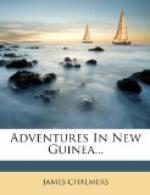For years past the idea has been gaining force in the public mind, both in the colonies and at home, that ultimately England would annex New Guinea. To any careful student of our history for the last century, it may appear strange that we have not done so long before. Our practice in the past has been to annex first, and to find reasons for it afterwards. To others, the very fact that even now the extremest step is only to proclaim a protectorate over a part, may appear to indicate that we are not quite so sure as we have been that annexation is wholly a blessing either to us or to the land annexed.
As already noted, in 1873, Captain Moresby did good service by accurately laying down the coastline of Eastern New Guinea. In accomplishing this, he discovered that there were several beautiful islands that had hitherto been considered part of the mainland. It is best perhaps to give what followed in his own words:—
“The importance of our discoveries led me to consider their bearing on Imperial and Australian interests. There lay the vast island of New Guinea, dominating the shores of Northern Australia, separated at one point by only twenty miles of coral reef from British possessions, commanding the Torres Straits route, commanding the increasing pearl- shell fisheries, and also the beche-de-mer fishery. It was also improved by the richness and beauty, and the number of their fine vegetable products—fine timber, the cocoanut, the sago palm, sugar- cane, maize, jute, and various vegetable fibres, fruits and rich grasses—and my conclusion, after weighing all the considerations involved, was, that it was my duty to take formal possession of our discoveries in the name of Her Majesty. Such a course secured a postponement of occupation by any Power till our Government could consider its own interests, and whilst the acquisition of these islands might commend itself, and my act result in annexation on the one hand, it might be negatived on the other with easy simplicity, by a neglect to confirm it.”
Accordingly, a cocoanut tree was transformed into a flagstaff, the British flag was run up, and duly saluted with cheers and volleys, and a picture of the proceeding adorns the captain’s book as frontispiece.
Ever since that time events have tended in the direction of bringing New Guinea into closer relations with England. On the one hand, there has been the conviction that if we do not annex it some other country will, and thus threaten Australia. Then many Australians have looked upon New Guinea as a possible paradise for colonists, and have been eager to establish themselves securely upon its soil. The attempts in this direction have produced little but disaster to all concerned.
On the other hand, missionaries feel that there is much to be said on the same side. Perhaps the opinion of no one man deserves more weight than that of Mr. Chalmers. We give his views, as he expressed them before the protectorate was proclaimed.




